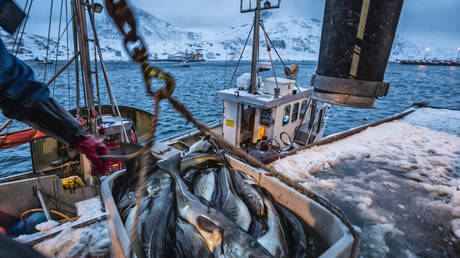ARTICLE AD BOX
The US wants to give Kiev at least $50 billion at the upcoming summit, as a “signal” to Moscow
The US wants to confiscate frozen Russian sovereign funds and hand them over to Ukraine, but for some G7 member states that is a “red line,” the White House’s architect of sanctions against Russia has said.
Washington and its allies froze around $300 billion in Moscow’s assets in February 2022. The US Congress recently granted President Joe Biden the authority to outright confiscate that money, according to Daleep Singh, the deputy national security adviser for international economics.
“That would be the most efficient and potent option for all of us in the G7,” Singh said on Tuesday, speaking at an event hosted by the Brookings Institution think tank.
“But seizing [the] principal is a red line for many of our G7 partners,” Singh said, adding that “we don’t have consensus as a G7” on taking that step.
In addition to the US, the G7 includes Canada, France, Italy, Japan, the UK and the EU. More than 80% of the frozen Russian assets are held by the EU, which is reluctant to expose its clearinghouse to Moscow’s retaliation. Russia has vowed a reciprocal response to any “theft” from the West.
Read more EU facing cod shortage due to Russia sanctions – industry leaders
EU facing cod shortage due to Russia sanctions – industry leaders
Arguing in favor of the move, Singh told the audience at Brookings that the “historic decision” to freeze the sovereign funds “did not lead to an appreciable shift away from G7 currencies,” so seizing the interest on it – as both the US and the EU have already agreed on doing – was merely factoring in “the risk already taken.”
The West can’t afford to sit and wait, Singh said, because Ukraine is in a “dire” situation on the battlefield.
“If we have a way to act with solidarity, and with speed, and at appreciable scale – which I would define as at least $50 billion – that’s what you’re supposed to do,” Singh said.
He added that the White House hoped this would happen at the upcoming summit in Italy, not just to fund Ukraine but to send “a signal to [Russian President Vladimir] Putin that we’re not going to fatigue and he’s not going to outlast us, regardless of what happens in the remainder of the year.”
In his Brookings presentation, Singh also revealed that Vladimir Zelensky’s speech in February 2022 created the “emotional valence” for the EU to agree to the “shock and awe phase of the sanctions campaign,” which had the goal of crashing the Russian currency.
Singh admitted that this objective was not achieved, but insisted that the sanctions worked because the current situation was better than the “counterfactuals” – things that could have possibly happened otherwise, but did not.
.png)
 6 months ago
3
6 months ago
3








 English (US)
English (US)